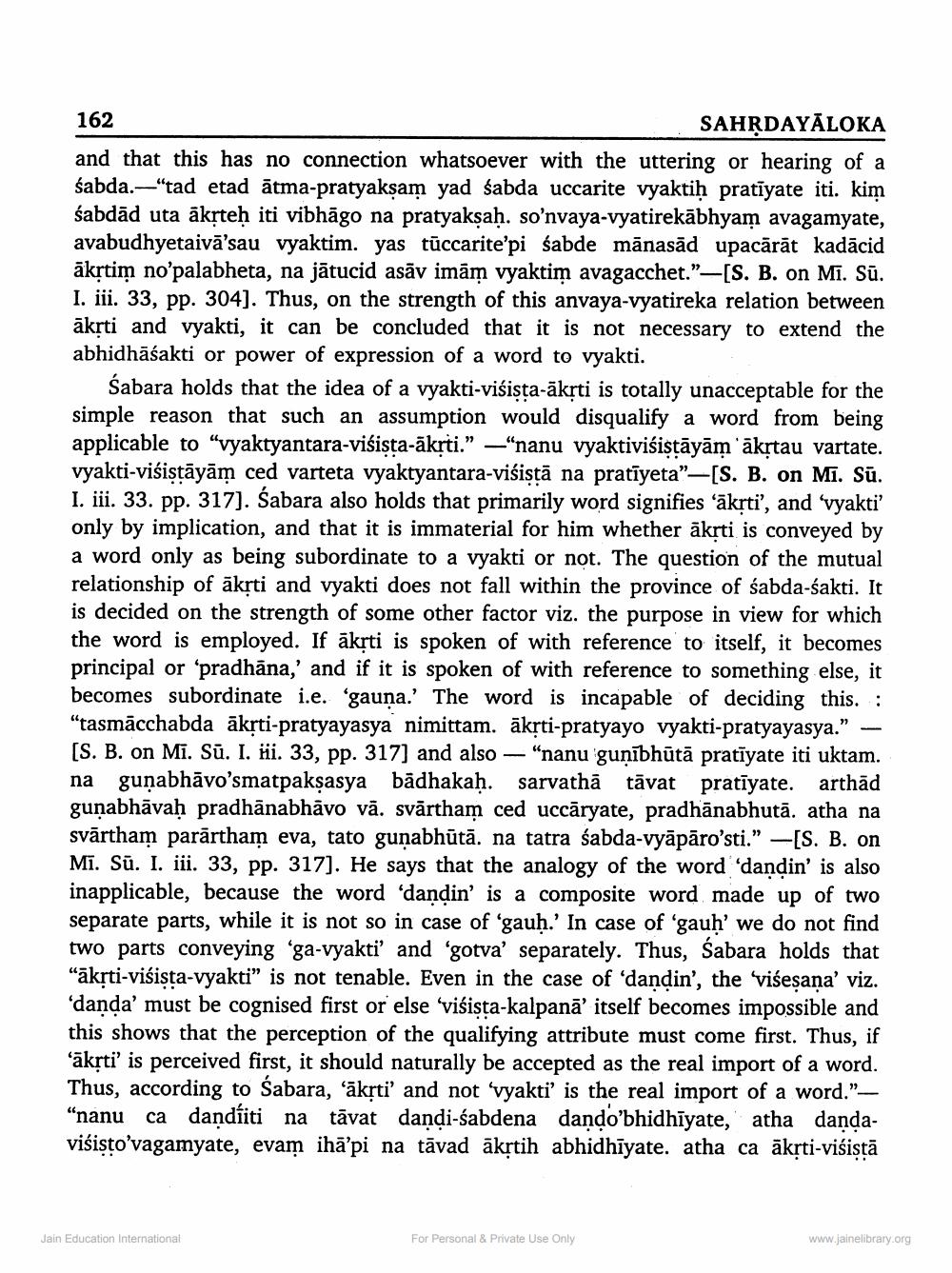________________
162
SAHṚDAYĀLOKA and that this has no connection whatsoever with the uttering or hearing of a sabda.-"tad etad ātma-pratyakṣam yad sabda uccarite vyaktiḥ pratīyate iti. kim śabdad uta äkṛteḥ iti vibhāgo na pratyakṣaḥ. so'nvaya-vyatirekābhyam avagamyate, avabudhyetaivā'sau vyaktim. yas tūccarite'pi śabde mānasād upacārāt kadācid ākṛtim no❜palabheta, na jātucid asāv imām vyaktim avagacchet."-[S. B. on Mi. Sū. I. iii. 33, pp. 304]. Thus, on the strength of this anvaya-vyatireka relation between ākṛti and vyakti, it can be concluded that it is not necessary to extend the abhidhāśakti or power of expression of a word to vyakti.
Śabara holds that the idea of a vyakti-visiṣṭa-ākṛti is totally unacceptable for the simple reason that such an assumption would disqualify a word from being applicable to "vyaktyantara-viśista-akṛti." -"nanu vyaktiviśiṣṭāyām ākṛtau vartate. vyakti-visiṣṭāyām ced varteta vyaktyantara-viśiṣṭā na pratīyeta"-[S. B. on Mi. Sū. I. iii. 33. pp. 317]. Śabara also holds that primarily word signifies 'ākṛti', and 'vyakti' only by implication, and that it is immaterial for him whether ākṛti is conveyed by a word only as being subordinate to a vyakti or not. The question of the mutual relationship of ākṛti and vyakti does not fall within the province of sabda-sakti. It is decided on the strength of some other factor viz. the purpose in view for which the word is employed. If ākṛti is spoken of with reference to itself, it becomes principal or 'pradhana,' and if it is spoken of with reference to something else, it becomes subordinate i.e. 'gauna.' The word is incapable of deciding this. : "tasmācchabda ākṛti-pratyayasya nimittam. äkṛti-pratyayo vyakti-pratyayasya." [S. B. on Mi. Sū. I. ii. 33, pp. 317] and also "nanu guṇībhūtā pratīyate iti uktam. na guṇabhāvo'smatpakṣasya badhakaḥ. sarvathā tāvat pratīyate. arthād guṇabhavaḥ pradhanabhāvo vā. svartham ced uccāryate, pradhanabhutā. atha na svārtham parārtham eva, tato guṇabhūtā. na tatra śabda-vyāpāro'sti." [S. B. on Mi. Sū. I. iii. 33, pp. 317]. He says that the analogy of the word 'dandin' is also inapplicable, because the word 'dandin' is a composite word made up of two separate parts, while it is not so in case of 'gauḥ.' In case of 'gauḥ' we do not find two parts conveying 'ga-vyakti' and 'gotva' separately. Thus, Sabara holds that "akṛti-viśista-vyakti" is not tenable. Even in the case of 'dandin', the 'viseṣaṇa' viz. 'danda' must be cognised first or else 'viśista-kalpana' itself becomes impossible and this shows that the perception of the qualifying attribute must come first. Thus, if 'ākṛti' is perceived first, it should naturally be accepted as the real import of a word. Thus, according to Sabara, 'ākṛti' and not 'vyakti' is the real import of a word."— "nanu ca daṇdíiti na tāvat dandi-śabdena dando'bhidhīyate, atha dandaviśisto'vagamyate, evam ihā'pi na tāvad ākṛtih abhidhīyate. atha ca akṛti-visiṣṭā
Jain Education International
For Personal & Private Use Only
www.jainelibrary.org




